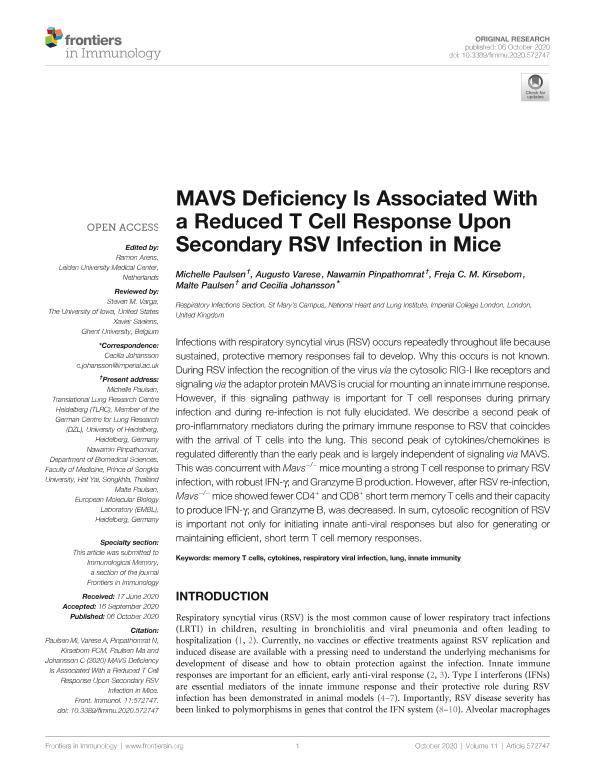Mostrar el registro sencillo del ítem
dc.contributor.author
Paulsen, Michelle
dc.contributor.author
Varese, Augusto

dc.contributor.author
Pinpathomrat, Nawamin
dc.contributor.author
Kirsebom, Freja C. M.
dc.contributor.author
Paulsen, Malte
dc.contributor.author
Johansson, Cecilia
dc.date.available
2023-11-06T14:45:51Z
dc.date.issued
2020-10
dc.identifier.citation
Paulsen, Michelle; Varese, Augusto; Pinpathomrat, Nawamin; Kirsebom, Freja C. M.; Paulsen, Malte; et al.; MAVS Deficiency Is Associated With a Reduced T Cell Response Upon Secondary RSV Infection in Mice; Frontiers Media; Frontiers in Immunology; 11; 10-2020; 1-11
dc.identifier.issn
1664-3224
dc.identifier.uri
http://hdl.handle.net/11336/217155
dc.description.abstract
Infections with respiratory syncytial virus (RSV) occurs repeatedly throughout life because sustained, protective memory responses fail to develop. Why this occurs is not known. During RSV infection the recognition of the virus via the cytosolic RIG-I like receptors and signaling via the adaptor protein MAVS is crucial for mounting an innate immune response. However, if this signaling pathway is important for T cell responses during primary infection and during re-infection is not fully elucidated. We describe a second peak of pro-inflammatory mediators during the primary immune response to RSV that coincides with the arrival of T cells into the lung. This second peak of cytokines/chemokines is regulated differently than the early peak and is largely independent of signaling via MAVS. This was concurrent with Mavs−/− mice mounting a strong T cell response to primary RSV infection, with robust IFN-γ; and Granzyme B production. However, after RSV re-infection, Mavs−/− mice showed fewer CD4+ and CD8+ short term memory T cells and their capacity to produce IFN-γ; and Granzyme B, was decreased. In sum, cytosolic recognition of RSV is important not only for initiating innate anti-viral responses but also for generating or maintaining efficient, short term T cell memory responses.
dc.format
application/pdf
dc.language.iso
eng
dc.publisher
Frontiers Media

dc.rights
info:eu-repo/semantics/openAccess
dc.rights.uri
https://creativecommons.org/licenses/by-nc-sa/2.5/ar/
dc.subject
CYTOKINES
dc.subject
INNATE IMMUNITY
dc.subject
LUNG
dc.subject
MEMORY T CELLS
dc.subject
RESPIRATORY VIRAL INFECTION
dc.subject.classification
Inmunología

dc.subject.classification
Medicina Básica

dc.subject.classification
CIENCIAS MÉDICAS Y DE LA SALUD

dc.title
MAVS Deficiency Is Associated With a Reduced T Cell Response Upon Secondary RSV Infection in Mice
dc.type
info:eu-repo/semantics/article
dc.type
info:ar-repo/semantics/artículo
dc.type
info:eu-repo/semantics/publishedVersion
dc.date.updated
2023-11-06T09:52:27Z
dc.journal.volume
11
dc.journal.pagination
1-11
dc.journal.pais
Alemania

dc.description.fil
Fil: Paulsen, Michelle. Imperial College London; Reino Unido
dc.description.fil
Fil: Varese, Augusto. Consejo Nacional de Investigaciones Científicas y Técnicas. Oficina de Coordinación Administrativa Houssay. Instituto de Investigaciones Biomédicas en Retrovirus y Sida. Universidad de Buenos Aires. Facultad de Medicina. Instituto de Investigaciones Biomédicas en Retrovirus y Sida; Argentina
dc.description.fil
Fil: Pinpathomrat, Nawamin. Imperial College London; Reino Unido
dc.description.fil
Fil: Kirsebom, Freja C. M.. Imperial College London; Reino Unido
dc.description.fil
Fil: Paulsen, Malte. Imperial College London; Reino Unido
dc.description.fil
Fil: Johansson, Cecilia. Imperial College London; Reino Unido
dc.journal.title
Frontiers in Immunology
dc.relation.alternativeid
info:eu-repo/semantics/altIdentifier/url/https://doi.org/10.3389/fimmu.2020.572747
dc.relation.alternativeid
info:eu-repo/semantics/altIdentifier/doi/http://dx.doi.org/10.3389/fimmu.2020.572747
Archivos asociados
